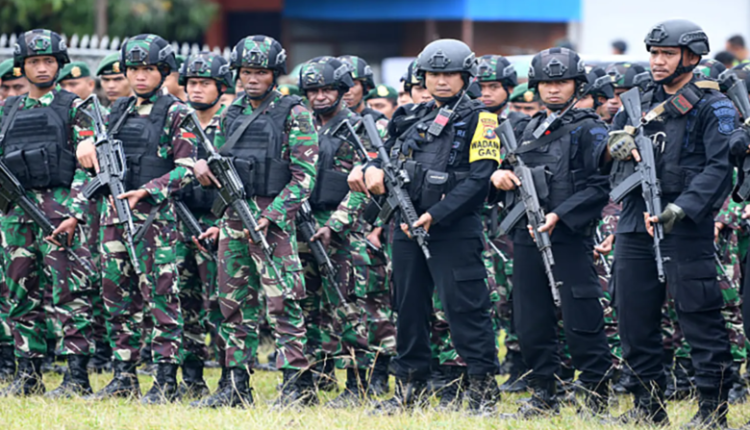Community Supports Firm Efforts to Handle OPM in Papua
Attacks by the Free Papua Organization (OPM) on TNI/Polri security forces, and even civilians, continue to occur today. This certainly adds to the long record of sorrow due to the conflict that occurred in the Land of Papua. Apart from that, the existence of the OPM is also a serious obstacle to development efforts in Papua. Investment and economic development are difficult to realize amidst the tension and uncertainty caused by OPM activities. The Papuan people themselves are the main victims of this situation, because violence and instability will only worsen their economic and social conditions.
This is the main reason behind community support for protecting stability, peace and security in Papua, as well as Indonesia in general. Acts of violence and terror carried out by separatist groups such as the OPM not only threaten the lives and welfare of local residents, but have also damaged infrastructure, hampered development and disrupted public order.
Senior politician who is also Chairman of the Golkar Party Advisory Board, Aburizal Bakrie supports the efforts of the TNI and Polri to take firm action against the separatist group calling itself OPM. Bakrie said that every attempt at rebellion against the Republic of Indonesia and disobedience to the Republic of Indonesia must be dealt with firmly, and there must be no compromise. This has nothing to do with human rights (HAM).
He added that the various incidents of violence that have occurred in Papua recently are considered intolerable. So the step taken by TNI Commander General Agus Subiyanto to change the name of the Papuan Armed Criminal Group (KKB) to OPM is the right step.
According to Bakrie, changing the designation of the Papuan Armed Criminal Group (KKB) to OPM, is one of the TNI’s firm steps in responding to various acts of armed violence, which are disturbing and detrimental to the community and TNI/Polri officers in Papua. Because, OPM is a separatist movement which clearly and truly poses a threat to the sovereignty of the Unitary State of the Republic of Indonesia (NKRI).
Apart from acting decisively, TNI/Polri officers are also asked not to abandon the welfare approach in order to help accelerate the development and welfare of the Papuan people. Bakrie views that a welfare approach carried out simultaneously with firm action will make the social security and order situation in Papua more conducive. This conducive situation then makes people calm in carrying out activities to improve welfare.
Apart from taking firm action against OPM, many people believe that solving problems in Papua should be carried out through political channels and constructive dialogue, not through violence or acts of terrorism. Support for the government to take firm action against OPM is part of the drive to uphold the supremacy of law and ensure that the country can maintain its security and territorial integrity, while still guaranteeing the welfare of the people within it.
A similar response was also conveyed by the Deputy Chair of Commission III DPR RI, Ahmad Sahroni, who said that neither his institution nor the Indonesian government had any doubts about eradicating OPM. All parties are considered to have been very consistent from the start that anything that threatens the Republic of Indonesia must be eradicated. This statement was also in response to the statement by the Co-Founder of the Institute for Security and Strategic Studies (ISESS), Khairul Fahmi, who said that policy support from the executive and legislative, in this case the DPR, is needed to eradicate OPM.
Until now, the various efforts being made by the TNI and Polri in the field as well as the government and DPR at the center to eradicate OPM have gone through various in-depth discussions and studies. Sahroni understands that the approach to resolving the OPM action must be carried out comprehensively, which also includes protection for civilians, infrastructure development, and so on related to the welfare of the people in Papua.
Sahroni also agreed that the OPM resolution must be holistic, and Commission III DPR RI is fully committed to supporting the National Police to carry out these efforts. What is certain is that the ultimate goal is to eradicate OPM from its roots. Therefore, the government, DPR, TNI and Polri, as well as related parties, will continue to make optimal efforts to eradicate OPM, resolve the conflict in Papua, and improve the welfare of the people in Papua.
However, it is important to remember that enforcement must be carried out with proportionality and within an appropriate legal framework. Steps to build dialogue, strengthen social inclusion, and improve economic prosperity in Papua must also be taken seriously to address the root causes of conflict in the region.
Firm action against the OPM is not an arbitrary action, but is a necessary step to protect human rights, maintain peace, and promote progress and prosperity for all Papuan people. These efforts must also be supported by strong diplomatic efforts, both at the national and international levels, to ensure that the resolution of the conflict in Papua can be achieved peacefully and sustainably.
In facing this complex challenge, it is important for the government and all stakeholders to work together coherently and based on the principles of justice, democracy and the rule of law. Only with a comprehensive approach based on dialogue and sustainable conflict resolution can Papua achieve true peace and build a better future for all its citizens.
